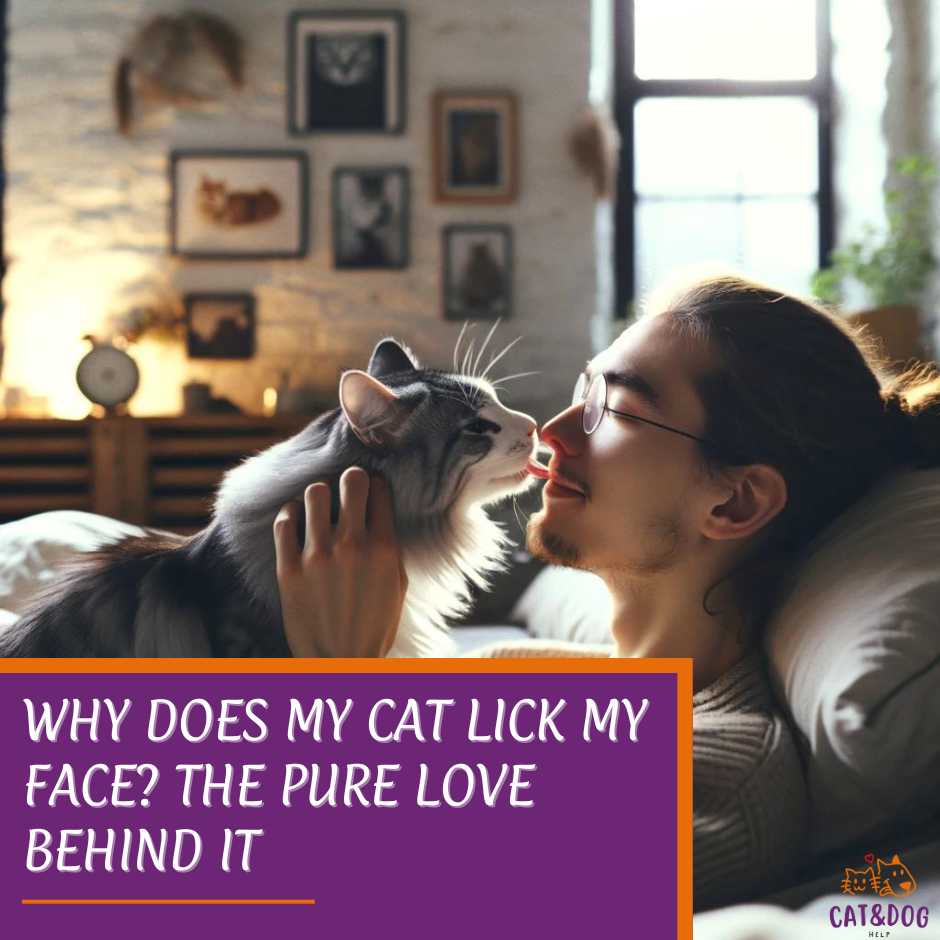Ever had a purring cat curl up on your lap and unexpectedly start to give your face a good licking? If you’re a cat owner, you might find this behavior endearing but also a tad bit puzzling.
Cats can’t exactly tell us why they do what they do, especially when it comes to doling out those sandpapery licks. So, why do they treat your face like it’s an all-you-can-lick ice cream buffet?
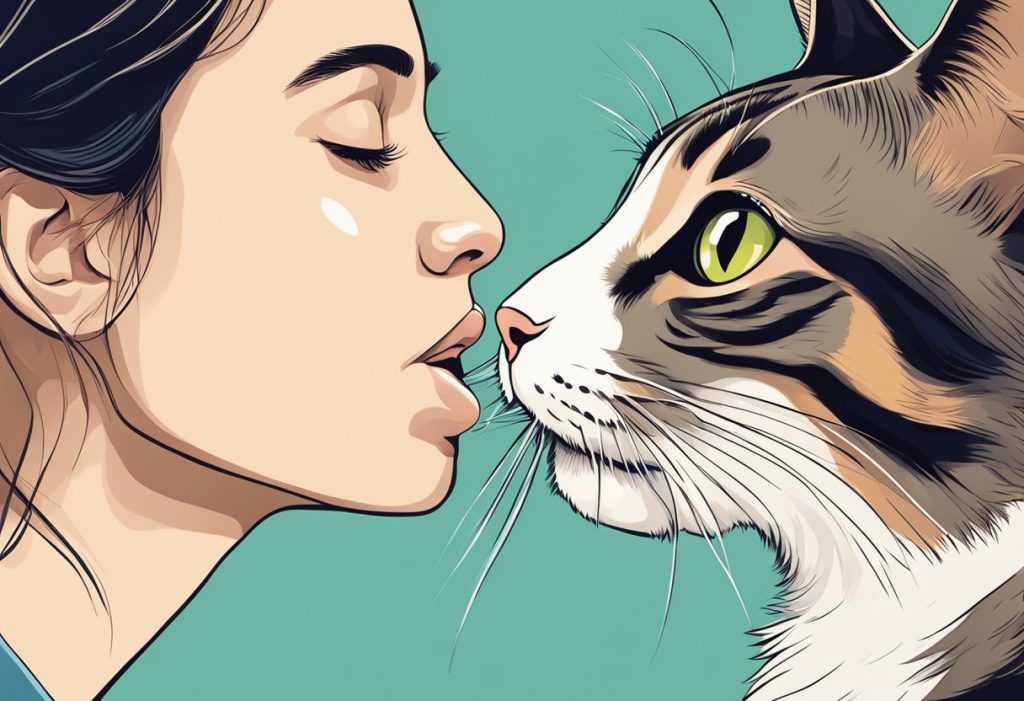
By realizing that your cat’s licks are more than just a tickle to your skin, you tap into a deeper understanding of your feline friend.
Deciphering this licking language can greatly enhance the emotional connection you share. (1)
This article unravels the mystery behind why your kitty feels compelled to treat your face like their own personal grooming project. (2)
dives into the psychology behind feline behavior, and leaves you with handy nuggets of knowledge that could help you better respond to your cat’s peculiar show of affection.
So buckle up, and let’s get ready to find out why my cat licked my face!
Key Takeaways
- Cat face-licking can signify affection and a sense of belonging.
- Understanding why cats lick faces can deepen the human-feline bond.
- Insight into this behavior provides valuable tips for responding positively to your cat’s affection.
Deep Dive into Behavioral Insights
Cats are known for their unique tongue, which is covered in tiny spines called papillae or barbs. These papillae help them groom themselves by removing dirt and loose fur from their coat. (3)
When a cat licks its owner’s face, it’s usually a way cats show affection and trust, also known as allogrooming. This grooming strengthens cats’ social bonds, so your cat may groom you to nurture your relationship.
It’s their way of showing love and bonding with their owner, just like how they were groomed and cared for by their cat’s mother during kittenhood.
This behavior continues into their adult lives, as they pass along the same sentiment to their cat parents. Although a cat’s tongue feels rough due to the sandpaper-like texture, it’s not harmful or painful to humans.
Allogrooming through cat saliva can promote bonding between cats and their owners, as it is the best way for them to show love and affection. (4)
Wild cats also see this behavior as a way to form tighter bonds or avoid aggression.
So if your cat licks your face, take it as a compliment and a sign of their love for you and that they consider you part of their family.
However, as a responsible pet owner, it is important to understand the possible reasons behind such behavior, such as the impact of kittenhood on a cat’s grooming behavior.
Consulting with a veterinarian can help determine if your cat is showing affection, marking you as part of their territory, or seeking attention.
Understanding these behavioral insights, such as the impact of kittenhood on a cat’s grooming behavior, can deepen the bond between you and your feline friend, and help you better understand the pure love behind your cat’s face licking. (5)
Psychological Factors Behind Licking
- Is it all about affection? Mostly, yes. When your cat licks your face, they might be harking back to their kitten days and showing you some love, much like they received from mom.
- Feelings of safety and comfort promote this behavior.
- Does it reflect their upbringing? Absolutely! Cats raised in a nurturing environment may display more licking as a sign of comfort or bonding.
Misconceptions About Cat Licking
- “They’re trying to clean me!” While cats are clean freaks, they lick you for bonding, not for your hygiene.
- Licking is more about connection, not cleanliness.
- Is the lick a secret cat code? Not quite—it’s their way of mingling scents and creating a communal ‘pride’ vibe.
- Think of it as a whiskered whisper saying, “You’re one of us.”
Remember, not all licks are created equal. Some gentle nibbles might come into play, which is often a sign of playful affection or your cat’s attempt to grab your attention.
Did you know that? It’s like your cat is combining a hi-five and a cuddle in a quirky way.
Keep an eye on the context of your cat’s licks. If they’re followed by a soft nuzzle, it’s likely love speaking.
But if there’s some hissing or swatting, you might have a little diva asking for space. In the cat world, respecting boundaries earns you major purr points!
Decoding the Affection: why does my cat lick my face?
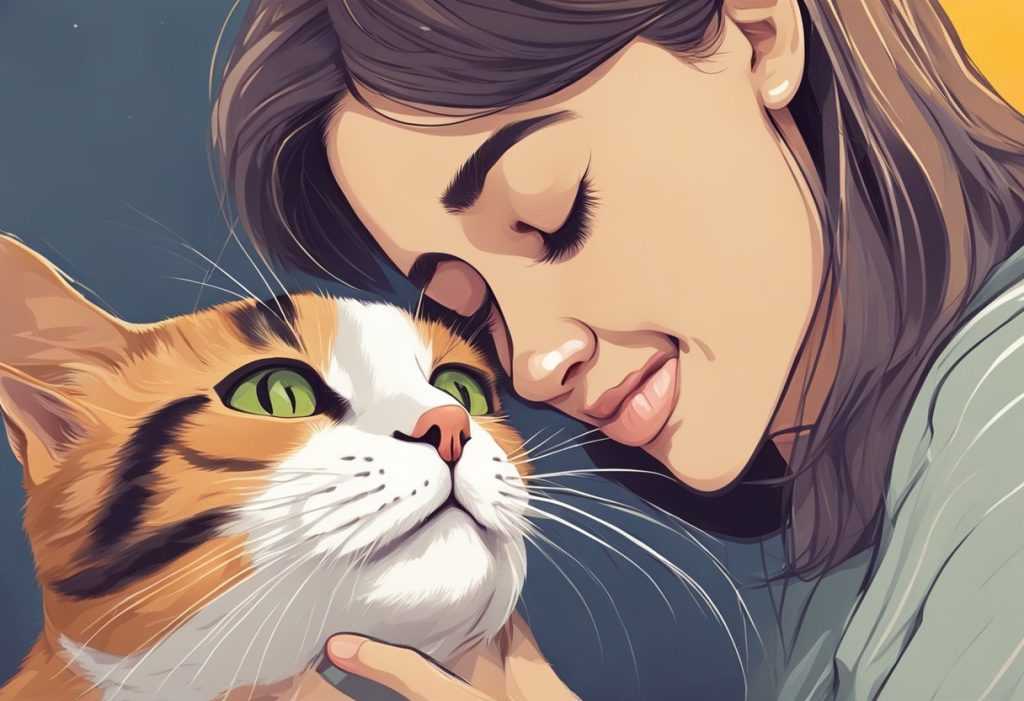
Your furry friend isn’t just delivering a wake-up call; this is a sign of true kitty devotion. Let’s unpack why your cat’s licking might be their equivalent to our hugs and kisses.
Expressing Love and Affection: Cats often groom each other in a display of affection and social bonding.
When your cat licks your face, they’re extending this gesture of love and care to you. It’s their way of saying “You’re family!”
- Much like a feline forehead, your face is a prime target for love licks.
- The act is akin to how we embrace loved ones to show our affection.
Seeking Attention and Communication:
- Licking can be a gentle nudge for your attention, signaling “Play with me!” or “Feed me, please?”
- It’s a form of silent meow communication saying, “Hey, look at me!”
Marking Their Territory:
- With scent glands located around their face, cats lick to transfer their scent and claim their favorite humans as part of their clan.
- It’s a compliment in cat language: “You’re part of my territory now.”
Remember, the next time your cat chooses to display their affection with a little lick, it’s their special way of saying, “I trust you, I love you, and by the way, you’re mine.” Isn’t that just purr-fect?
Behavioral Insights: Understanding Your Cat Better
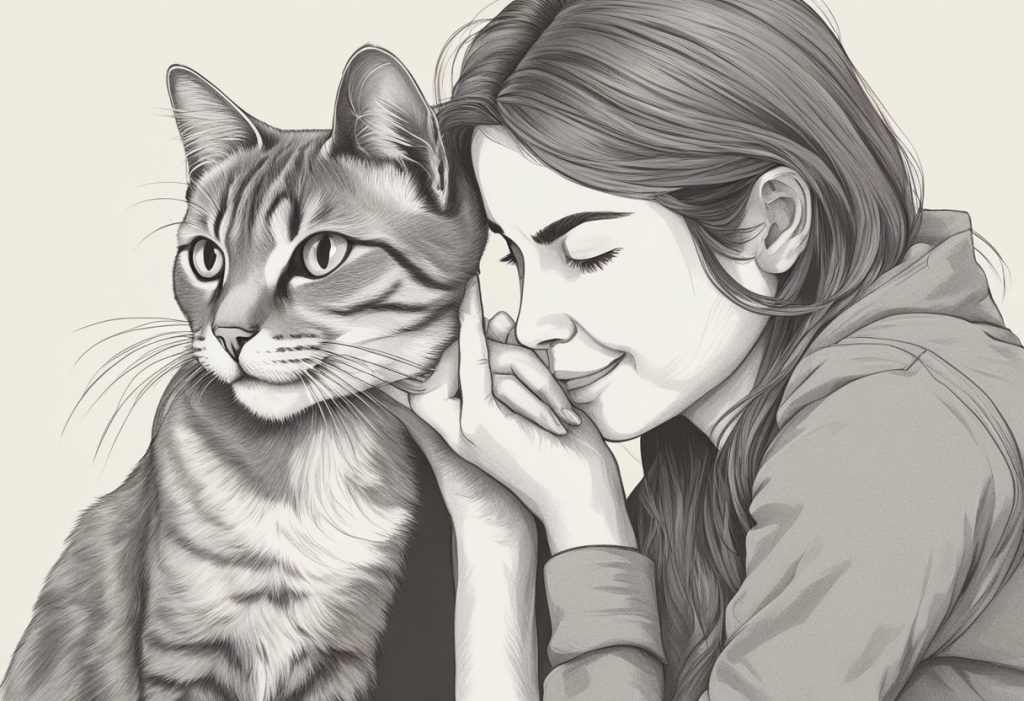
The Psychology Behind Licking
Licking isn’t just about personal hygiene. For your cat, it’s a soothing ritual. If you’ve got a rescue kitty separated from their mom too early, licking could be their go-to for some much-needed comfort.
It’s like a security blanket but with more saliva. A case study by Dr.
Whiskers reveal that cats weaned prematurely may overcompensate by licking extensively, almost as if they’re searching for that tender maternal care.
Misconceptions and What Licking Means
Now, let’s bust a myth: not every lick spells dominance. It’s a common blunder to think our feline overlords are trying to assert their reign with their tongues. Instead, pay attention to what else they’re up to.
Are they purring and nuzzling you, too? Then that’s not a power move; it’s pure love, trust me.
- Affection: Think of it as a kitty kiss!
- Bonding: Your cat views you as part of their tribe. Welcome to the clowder!
- Grooming: They notice you’re a bit less fluffy than they are and offer a helping tongue.
Ask yourself, “What’s a kitty’s MO?” Is there purring, slow blinking, or a fluffy tail upright and twitching?
You’re witnessing signs of true cat affection. On the other hand, if your cat seems tense, it might be time to dig a little deeper into those behavioral cues.
Remember, your cat’s licks are less about claiming their throne and more about them saying, “You’re the cat’s pajamas, and I trust you completely!”
So the next time you get a sandpapery smooch, know you’re doing something right in your cat’s eyes.
Practical Advice for Cat Owners
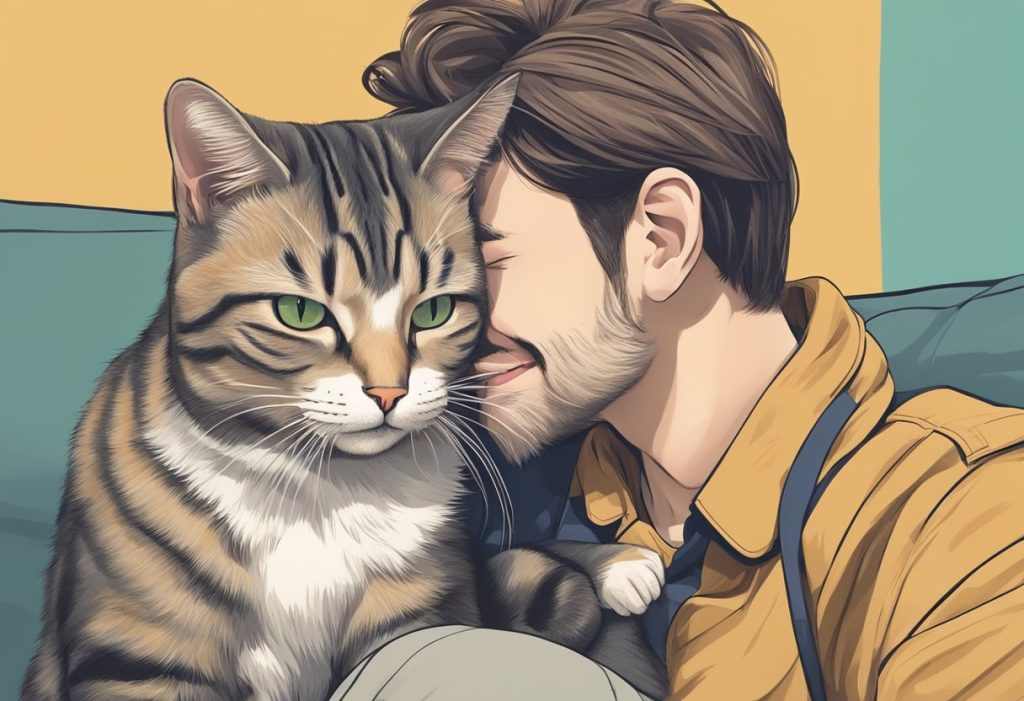
Encouraging Healthy Licking Behavior: Cats naturally groom and being subject to a little ‘kitty spa time’ can be both endearing and comforting. (6)
- Toys and Tools: Have grooming brushes or interactive cat toys at the ready. These can simulate the grooming process for your cat and provide them the satisfaction of using their tongue without involving your face.
- Regular Grooming Schedule: Create a grooming routine that aligns with when your cat seems most interested in licking you. This can redirect their grooming behaviors effectively.
Addressing Excessive Licking: Sometimes, your cat’s licking might cross into excessive territory.
- Observation: Take note of how often and when the licking occurs. Is it after a meal? Is it when you arrive home?
- Veterinary Insight: If the licking seems persistent, a chat with your vet can’t hurt. It’s essential to rule out any possible health issues, such as dental discomfort or nutritional deficiencies.
- Behavioral Techniques: When medical issues are off the table, consider behavioral modification techniques. Variations in playtime, or the introduction of new enrichment activities, can work wonders.
Remember, you aim to both understand and manage your cat’s grooming habits, always keeping their well-being and happiness at the forefront.
Keeping the love and the purrs, while maybe saving your face from a tiny bit of exfoliation!
Health and Well-being: The Impact of Licking
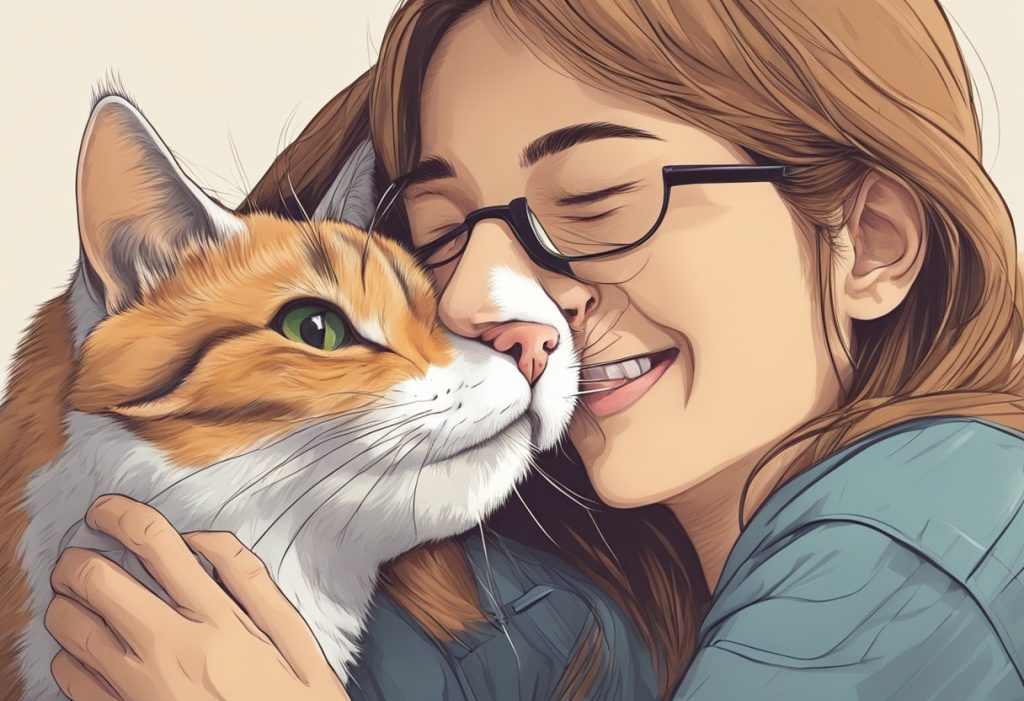
While it’s often a sign of affection, changes in your cat’s licking behavior can be a bit like an early-warning system, indicating that a trip to the vet might be in order. Here’s what you should keep an eye on:
Signs of Health Issues:
- Increased Licking: If you notice a surge in the amount of licking, it could signal discomfort or pain.
- Licking Non-Food Items: When your kitty starts licking inanimate objects obsessively, it could be a sign of nutritional deficiencies or health issues.
- Changes in Licking Behavior: Any sudden change, either more or less licking, deserves attention. (7)
Now, don’t get too worried if your furry friend’s sandpaper kisses become a regular part of your routine. In many cases, it’s their way of saying, “Hey, you’re part of my tribe!” However, it pays to be observant.
Promoting Health Through Understanding:
- Routine Check-ups: Keep up with regular vet visits to ensure your cat’s health is on track.
- Stress-Related Licking: Licking can also be a stress reliever for some cats. If your cat’s licking seems compulsive or anxious, consider their environment. Is there a source of stress you can remove?
Licking isn’t just about cleanliness or bonding; it’s also a window into your cat’s well-being.
By understanding what’s normal for your cat and what’s not, you can help ensure that they stay happy, healthy, and ready to enjoy many more face-licking moments with you.
Don’t you just love those whiskery, tickly signs of feline affection?
Quick Recap
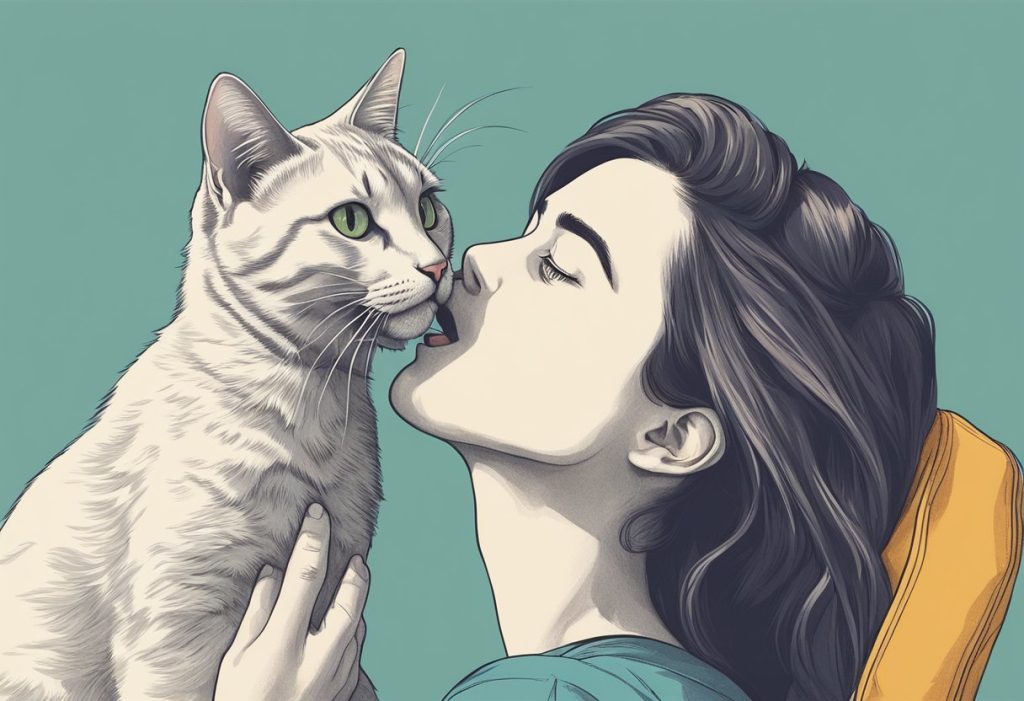
The Role of Licking in Your Relationship
- Ever wonder why your furry companion is so intent on giving you a facial with their tongue? It’s about family and affection. They see you as part of their clan.
- Affection: They’re showing love, as a mother cat would do to her kittens.
- Comfort: Your scent is reassuring, and licking helps strengthen the social bonds.
- Grooming: Yes, they might think you need a bit of cleaning up—it’s their way of caring.
Have you caught your cat in the act? Their sandpaper kisses mean more than just wet cheeks.
Moving Forward with Love and Understanding
- Don’t brush off these tender moments; they’re building blocks of your bond.
- Positive Reinforcement: Gently reciprocate their affection with pets or kind words.
- Reading the Signs: Note if the licking is excessive, which could indicate health issues. If in doubt, a vet visit is a good idea.
Cats lick your face to communicate and cement the love-filled relationship you share with them. Isn’t that paw-some?
Frequently Asked Questions
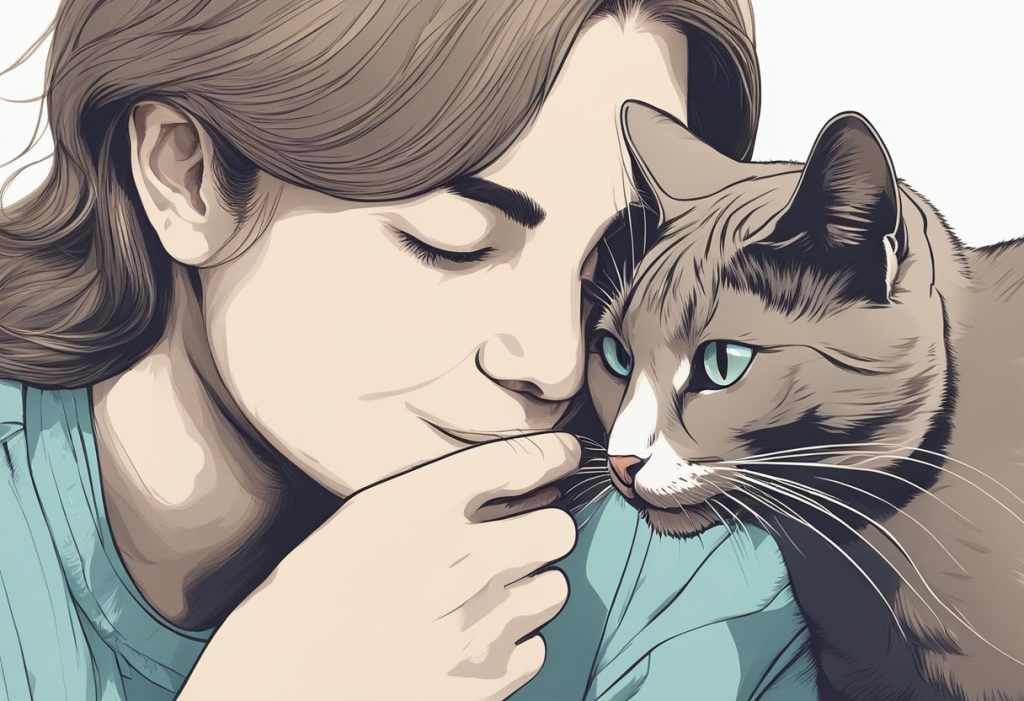
What does it mean when your cat lavishes you with licks on your face and a purring serenade?
When your cat licks your face while purring, it’s showing you pure love and acceptance.
Think of it as a kitty kiss mixed with a comforting hum – your cat’s way of saying “you’re part of my family.”
Noticing more kitty smooches in the morning? Curious why your feline friend shows this dawn affection?
Mornings can be prime time for your cat’s affection, possibly because it’s when they’re most active and seeking interaction.
So, those early AM lick fests? They’re your cat’s way of saying “Good morning, let’s start the day together!”
Are you puzzled over your cat’s quirky habit of licking and then giving a little nibble? Wondering what’s behind this love-bite combo?
Those little nibbles following a lick are often part of affectionate play or grooming.
It’s a gesture that in cat lingo means “I care about you” or “I’m comfortable enough to treat you like I would another cat.”
Can feline face-licking at night-time be a sign of something more than just affection?
While night-time licks are often signs of love, they can also indicate your cat’s need for attention or even be a response to stress or anxiety.
It’s their silent meow for comfort or companionship.
Is it safe and hygienic to welcome your furry pal’s licks on your face, or should you discourage this behavior?
While a cat’s tongue is relatively clean and their licks are a sign of affection, it’s best to keep it to a minimum for hygiene reasons.
Feel free to enjoy the love but keep those kitty kisses in check to avoid potential allergens or bacteria.
Feel like you’re getting exclusive treatment when your cat picks you for licks and not your spouse? Wondering why?
Your cat may have singled you out for those affectionate licks because of a special bond or simply because your routine might sync more with their own.
You’re the chosen one, at least in your cat’s eyes!
- Advantages of Playing Casino Online - July 6, 2025
- How players can take advantage of the no deposit bonus at the Casino - July 5, 2025

